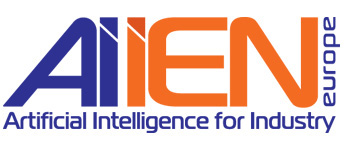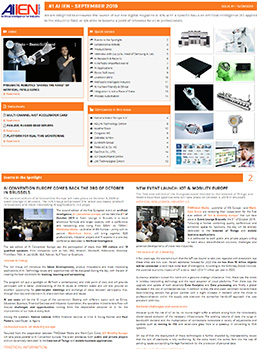What does it mean to conduct research in AI for a telecommunications company? For Dr. Elena Fersman, Director of Artificial Intelligence Research at Ericsson, it means being able to tackle relevant problems by simplifying processes and creating new algorithms. Without putting ethics aside.
IEN Europe: How long has Ericsson been conducting research in AI?
E. Fersman: Ericsson has been doing research in AI for more than ten years. When I started heading up AI research at Ericsson, five years ago, I led several teams, which then grew bigger. Now, Ericsson has a unique AI research group, made up of a lot of people working on many different technologies.
Personally, I’ve been working on AI for my entire career since university. Before being appointed as Director of Artificial Intelligence Research, I worked in different positions at Ericsson. The last few years marked a significant change in terms of AI research strategy, but it’s been two years that AI is really taking hold on a large scale in the telecommunications industry.
Ericsson has a huge portfolio of products and services, but in the last two years it has become more and more AI-centric. We are preparing all the software architectures to make them ready for AI and many other exciting projects are on the way.
IEN Europe: What does it mean to conduct research in AI for a company like Ericsson?
E. Fersman: AI research has completely changed over the last ten years. Ten years ago, we didn’t have so much data, or data was there but we didn’t use it for our AI applications. Now we have even too much data and researching in this type of environment is very exciting. At the beginning, you can use simple methods and analytics and try more learning methods. Then you go for more sophisticated methods, like vanilla machine learning methods, and you increasingly refine your research methods on the way.
In these ten years of research, we’ve always tried to advance and build upon ourselves. For me, the core of our research activity is the ability to adapt AI to our own business context. Research in AI is not a theoretical exercise. It’s always something practical, based on finding advanced problem-solving solutions and methods. Another critical point is being able to create our own algorithms.
This is a very simplified vision of how I conceive and work on AI research. I always tell my research team that we are not an organization that simply takes AI algorithms off the shelf and apply them. We develop new AI algorithms, always having the relevance in mind.
IEN Europe: What does it take to develop new algorithms?
E. Fersman: It’s really a big machine. We have a lot of researchers, and even before we start, we always work with our stakeholders, customers, and business units, to have a relevant context. Doing a theoretical exercise will not help to create a good algorithm. So it’s a constant chain of feedbacks given to us. We always ask ourselves if we are on the right track.
It also takes a mix of competences. In the academic environment, quite often you dig into one domain and then you become an expert, but this doesn’t work in the industrial setting. Here, it’s always a matter of mixing different competences, putting together people with different experiences and backgrounds.
IEN Europe: What do you mean by ''AI helps make complex things simpler''?
E. Fersman: Communication means simplification. That’s what drives a company like Ericsson. AI helps simplify telecommunications. If you are an engineer and you need to solve a problem, either you are alone without any support from the algorithms, or you do have your support system, which gives you some recommendations. This is a simplification for an engineer. We do the same for our customers, helping them make network slicing easier by using algorithms and suggestion systems. This can be applied to many contexts and it’s a real model for simplification.
IEN Europe: Which are the main application areas for AI within Ericsson?
E. Fersman: AI is spread everywhere in our business units and portfolio of products and services. We use it even internally. But we identify three main areas of deployment: 1) AI for boosting automation 2) AI to optimize Ericsson’s products and services 3) AI to power new businesses and telecoms.
Zooming in, we aim to optimize network performance, customer experience, efficient operations, virtualization and network slicing, energy efficiency, and infrastructure utilization. These are our six major blocks.
IEN Europe: How is it possible to make good use of Big Data, without forgetting the value of Small Data, for a big telecommunications company today?
E. Fersman: At Ericsson, we have a data strategy and our data lake, and we have very strong security and privacy framework. We have a lot of internal data that we can see coming from our own equipment. We use data lake infrastructures for big data, but it’s also very important to find small data. We are running operations for a lot of mobile telecom operators, translating into more than one billion subscribers in our networks. When you run such a huge operation, sometimes you need to detect anomalies or failures that can happen. Monitoring small data is therefore essential to this purpose. Ericsson is committed to dedicating part of its research activity to monitoring and finding the small data.
IEN Europe: What’s the interaction between 5G and AI?
E. Fersman: AI is just a central part of 5G in many cases, especially for signal and coverage optimization. There are algorithms in many parts of 5G network systems, but there is also an overarching strategy that controls all of them. 5G is extremely complex and cannot be optimized and simplified without AI.
IEN Europe: You mentioned once that ‘Diversity, balance, and inclusion are very important in AI’. How is it possible to develop ethical AI?
E. Fersman: I believe that ethics must come first when developing an algorithm for process optimization. If ethics is not taken care of from the beginning, the algorithm may misbehave. That’s why it’s essential to decide what we allow or don’t allow an algorithm to do at an early stage. This must be the framework.
Ericsson is committed to business ethics. We have chosen to follow the Ethical Guidelines for a Trustworthy AI from the European Union and we are complying with them. As a next step, we need to digitalize these guidelines to make them machine-readable and enforceable on algorithms.That’s what we are currently doing at Ericsson. This is a huge opportunity to ensure that every algorithm you run complies with all the ethical guidelines. We are also putting a lot of effort into explainability. When the algorithm makes a decision for you, you must be able to ask why and understand the reason of this decision. This is very important in any AI application and telecoms as well.
Sara Ibrahim


















